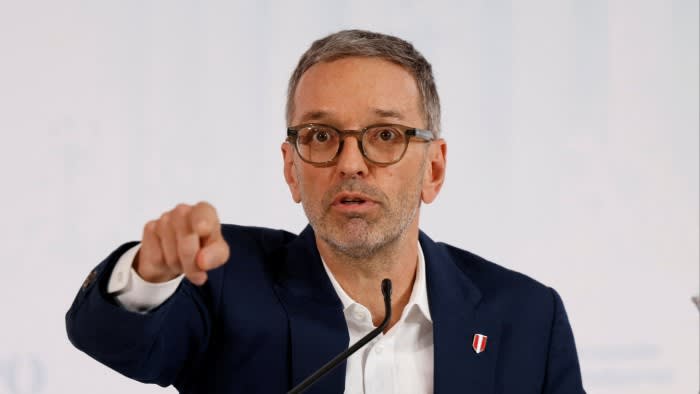Jan Marsalek’s current whereabouts are unknown, but officials from two European intelligence agencies told the FT they had high confidence that he was in Moscow © Bloomberg
The Austrian police warrant for Ott’s arrest contended that he was commissioned by Jan Marsalek, a fugitive former senior executive of Wirecard, the collapsed German financial services firm, to assist Russian espionage around Europe.
Marsalek, an Austrian citizen who was deeply implicated in the Wirecard fraud and is now believed to be in Russia, is regarded by western intelligence agencies as having been a longtime operative for Moscow.
Recommended
Now the FPÖ is fighting against accusations from its political rivals that
some of Ott’s alleged activities on behalf of Russia occurred while Kickl was Austria’s interior minister.
Kickl and the FPÖ not only deny any wrongdoing, but point out — not without reason — that any lapses in national security could be blamed on the ÖVP. After all, the mainstream conservatives were the dominant party in the 2017-2019 coalition.
Russia in Austrian politics
The fact remains that most Austrian parties have taken a lenient view of Russia for many decades, but the FPÖ is the most pro-Kremlin of them all — although you would not necessarily reach this conclusion after looking at its election manifesto.
That plays down the party’s connections to Russia and emphasises other themes that it believes will resonate with voters — how to control immigration, the role of Islam in Austrian society and the state of the economy (here in German is the FPÖ’s summary of its programme, labelled “Fortress Austria. Fortress of Freedom”).
The FPÖ skilfully conceals its Russophile sympathies behind the cloak of Austrian neutrality, which is undoubtedly dear to voters. Aimé Mühlemann, writing for the European Horizons Editorial Board site, says:
Austria has yet to accept the changing realities of Europe since the cold war . . . the population continues to see itself as a mediating country between Russia and the west, exemplified in the continued import of the majority of its gas from Russia and business with its companies . . .
Western intelligence agencies have grown increasingly reluctant to share sensitive information with Austria due to its close connections with Russia.
How disruptive for the EU would the next Austrian government be, if it contained or were led by the FPÖ?
In propaganda and rhetoric, the FPÖ’s hostility to the EU sets it apart from all mainstream Austrian parties. Before the European parliament elections, the FPÖ campaigned under the slogan “EU-Wahnsinn stoppen” (stop EU madness).
According to the European Commission’s regular Eurobarometer surveys, Austrians tend to have somewhat more negative views of the EU than do European citizens on average.
However, the FPÖ does not seriously pursue the goal of Öxit, or Austria’s exit from the EU. Rather, like Hungarian premier Viktor Orbán or French far-right leader Marine Le Pen, the party aims to transform the EU from within into a loose collection of nation-states.
In this spirit, the FPÖ is one of the three founding parties — along with Orbán’s Fidesz and the Ano movement of former Czech premier Andrej Babiš — of a new hard-right European parliament political group called Patriots for Europe.
Should the FPÖ lead or be part of Austria’s next government, it would certainly add its voice to those demanding a less pro-Ukrainian policy in the war with Russia, and to those resisting the EU’s new asylum and migration pact.
All in all, quite a headache for the EU, whose leaders we can be sure will follow Austria’s election campaign with close attention.
Dancing with Putin: why Austria is still so close to the Kremlin — an analysis by Meret Baumann for the Neue Zürcher Zeitung
Tony’s picks of the week
Fund managers, bankers and companies that used to raise capital in Saudi Arabia are feeling the effects as the kingdom switches the investment focus of its $925bn sovereign wealth fund to domestic priorities, the FT’s Andrew England, Chloe Cornish and Brooke Masters report
Pro-Kremlin social media accounts in Germany that spread far-right messages and conspiracy theories are often linked to individuals with a Russian background or family history, Sophia Winkler writes for the Berlin-based Centre for East European and International Studies
Recommended newsletters for you
The State of Britain — Helping you navigate the twists and turns of Britain’s post-Brexit relationship with Europe and beyond. Sign up here
Working it — Discover the big ideas shaping today’s workplaces with a weekly newsletter from host of the FT’s Working It podcast Isabel Berwick. Sign up here
Source link : https://www.ft.com/content/8012d5e2-339a-4e8e-80f5-e0e4de738752
Author :
Publish date : 2024-08-24 07:00:00
Copyright for syndicated content belongs to the linked Source.
